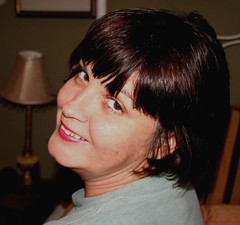These pictures are from Rosie. She visited the Grande Riviere area of North Trinidad and took these photos a few months ago. Every year from March to September, we are fortunate enough to witness the miracle of the Leatherback Turtle nesting on the beaches of our north coast. The Leatherback turtle (Dermochelys coriacea) is the largest reptile in the world and is larger than other sea turtles. Leatherbacks can regularly weigh in at up to 1000 pounds. Ifound this link on BBC- it's worth visiting -http://www.bbc.co.uk/mediaselector/check/player/nol/newsid_6920000/newsid_6924400?redirect=6924404.stm&news=1&bbram=1&nbram=1&nbwm=1&bbwm=1&asb=1 They are the only sea turtles without a hard shell or scales. Instead the "shell" is a semi-flexible carapace ( upper shell). Each turtle has a distinctive, unique pink spot on the top of its head that is as distinct as a fingerprint. It is thought that this spot may help sense light or direction but this has not been proven. I think that it may be an identifying feature and I love the thought that each little hatchling is unique with its own little pink spot.
They are the only sea turtles without a hard shell or scales. Instead the "shell" is a semi-flexible carapace ( upper shell). Each turtle has a distinctive, unique pink spot on the top of its head that is as distinct as a fingerprint. It is thought that this spot may help sense light or direction but this has not been proven. I think that it may be an identifying feature and I love the thought that each little hatchling is unique with its own little pink spot.
Females nest approximately six times every two to three years and are almost always tropical. Major nesting beaches are in Suriname, French Guiana, Trinidad, Tobago, Costa Rica, and Gabon.
 The season lasts from March to July but hatchlings can sometimes be seen as late as September. Remarkably, females will return to lay on the same beach on which they were hatched. The whole process takes about two hours and she will lay up to 80 eggs at a time after digging a deep hole called an egg chamber with her rear flippers.
The season lasts from March to July but hatchlings can sometimes be seen as late as September. Remarkably, females will return to lay on the same beach on which they were hatched. The whole process takes about two hours and she will lay up to 80 eggs at a time after digging a deep hole called an egg chamber with her rear flippers. The beautiful sight of these prehistoric creatures pulling themselves out of the sea to give birth on a strip of sand identified only by a dim memory is one of the true miracles of life.
The beautiful sight of these prehistoric creatures pulling themselves out of the sea to give birth on a strip of sand identified only by a dim memory is one of the true miracles of life.
Once she has completed her mission, she will attempt to disguise the area by erasing her tracks with her front flippers. After the nest has been concealed, she will return to the sea and leave the nest without returning. She has done her part.
Thank you Rosie.






